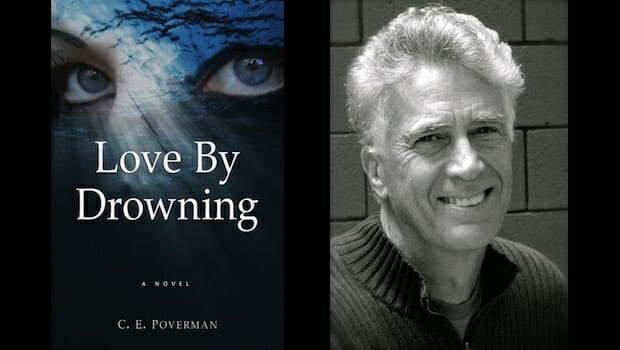 C.E. Poverman first book of stories, “The Black Velvet Girl,” won the Iowa School of Letters Award for Short Fiction. His second, “Skin,” was nominated for the Los Angeles Times Book Prize. For this interview, the author of “On the Edge” discusses his latest novel titled “Love by Drowning.” The former creative Director of Creative Writing at the University of Arizona talks about issues in writing and where this book about obsession came from.
C.E. Poverman first book of stories, “The Black Velvet Girl,” won the Iowa School of Letters Award for Short Fiction. His second, “Skin,” was nominated for the Los Angeles Times Book Prize. For this interview, the author of “On the Edge” discusses his latest novel titled “Love by Drowning.” The former creative Director of Creative Writing at the University of Arizona talks about issues in writing and where this book about obsession came from.
When asked about making an argument in his fiction writing, Poverman said, “I almost never make an argument or address an issue explicitly.” He added, “I do think that themes and values emerge through the authentic point of view and interaction of characters. Several themes are at work in ‘Love by Drowning. In Davis’ sudden death in a fishing accident, I’m exploring the effects of a catastrophe on survivors in a family—and its on-going effect over time in what had been an already charged relationship between two brothers. This in turn opens the door to the obsessive relationship, which the surviving brother, Val, has with Davis’s girlfriend—or was she his wife, as she will later claim?”
The idea for “Love By Drowning” came to Poverman when he read the story of a man being pulled overboard in a boating accident. “One minute,” said Poverman, “he is handling the wire leader of a smallish marlin, and the next minute he’s over the side and gone in maybe 20 or 30 seconds. I sat up in my chair and was freaked.” One reason the article resonated so loudly with Poverman is that he was an experienced boater. “I’d grown up on boats; my father always had boats and being on them and handling them, working on them, smelling them, getting tossed around in them were second nature. I was always comfortable—pretty at ease—but implicit in your being on a boat is that you can get knocked overboard, injured, run over. For years, boats ran through my dreams.”
About a year later while on a family vacation at a beach house in Connecticut, Poverman’s subconscious made a connection with the boating article. He said, “Lightning flashes illuminating the dark in which I start seeing and hearing things—images, scenes, people talking—and in a charged atmosphere and mood, a kind of pervasive internal environment starting to envelope you, and I started just writing down scenes with no real sense yet of what was happening or how it was happening, but I could see stuff going on.” The images and scenes he wrote eventually led to “Love By Drowning.” Poverman also said, “The writing of a book isn’t a linear process, but, more I think, an associative one, something like making a nest. I need to know two things before I can start writing something, which are: why is the story happening now? Or, another way of saying it is, what sets things in motion and causes an imbalance in the world of the characters. And I have to find the one central action, the one thing that the POV character, has to do.”
More information:
Learn more about C.E. Poverman on his website at www.cepoverman.com.
Do you have comments/questions for C.E. Poverman? Have you had a similar “triggering incident?”

Recent Comments